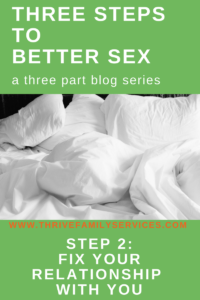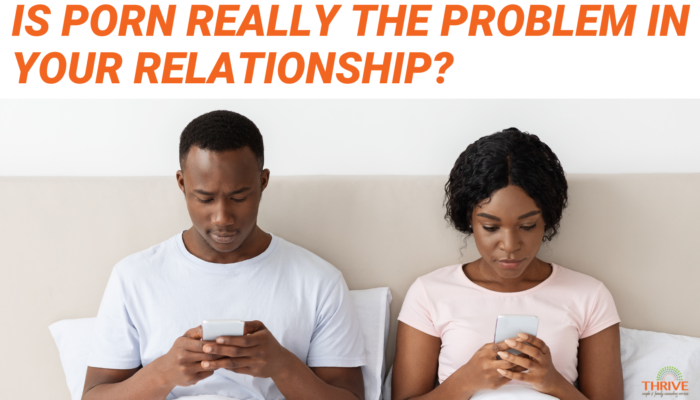3 Steps to Better Sex: Part 2 – Fix your relationship with yourself!
Your relationship with yourself, especially around sex, is the key to growing and nourishing your sexual relationship with your partner.
Imagine a married woman with a loving husband to whom she is very attracted. She remembers back when they would enjoy sex at the drop of a hat, excitedly and without a second thought.
She wonders where those feelings have gone, and why her sexual desire seems to have faded to nothing. When she looks at him, she sees her handsome husband, lovely as ever.
She wants to want to have sex, but the cogs just aren’t turning in the right direction. When it comes to sex, her body is slow to catch up with her mind.
Sexual desire after the honeymoon phase can feel like an elusive thing for some people. It’s easy to take sexual desire for granted when sometimes it’s all you can think about in the beginning of a relationship.
But, when sexual desire seems to decrease or even disappear, it can be frustrating, confusing and concerning!
One or both of you might start to worry:
“Is this it for us in the sex department? Was that as good as it gets?”
You’d be surprised at how many couples (and individuals) experience a change in sexual desire after the newness of the relationship fades.
For many people, especially for women, it’s really an opportunity to learn what makes you tick! Check out our other post on sexual desire to learn why your sexual desire may not have disappeared after all, and what you can do about it.
Common Challenges with Sexual Desire
We often find that people want to want to have sex with their partner. They have the mental longing for sexual closeness, but their body is just not responding as they would hope. Why? It depends on the person! Everyone is different, but common causes are:
- Negative and even conflicting messages about sex we absorb from our culture
- Misconceptions about how sex and desire “should” be
- Not understanding how your unique sexual desire builds, and what stops it
- Misunderstanding the foundations which set the tone for sexual arousal
- Negative body image
- Sexual trauma history that needs healing
- Negative self-talk about worthiness, performance, and even about your sexual desire
- Hidden or unspoken fears and vulnerabilities about the relationship
- Misunderstanding your partner’s desire for sex
- Lack of communication with the other person, lack of security in the relationship
What’s the solution to ramping up your sexual desire?
It’s important to approach the matter with kindness and patience toward yourself. Remember that it’s not your fault. It doesn’t mean that you’ve lost interest in your partner, or that you are no longer a sexual person.
The great news is that you don’t have to repair your sexual relationship with yourself all alone. In fact, bringing your partner in to share the load of your woes is one of the best steps you can take.
Something you may not have considered is that your sexual connection with your partner can be tied in with your sexual relationship with yourself. Don’t underestimate the destructive power of vulnerable feelings, body image issues and negative self-talk on your sexual experience.
No matter who you are, or what hurdles you face, you deserve to treat yourself gently and with respect, just as you’d expect your partner to treat you. This can be a great stepping stone toward deeper sexual connection.
Think of it this way: you can kill two birds with one stone by getting in touch with yourself as a sexual being, as well as strengthening the sexual bond with your partner.
Where do we come in?
Through Denver couples counseling sessions, we can guide you and your partner through the process of strengthening your sexual relationship with yourself, and with each other. Some of the steps we will go through include:
1. What kind of sexual desire do you identify with? (Responsive or spontaneous)
Do you have sex to feel closer to your partner?
Or, do you need to feel close first in order to want sex?
Either way you answer those questions, you are are perfectly normal.
If you’re struggling to find that burning desire, don’t make the mistake of thinking you simply don’t have a sex drive. For you, just like the majority of women, it might just be that you have a responsive desire.
Nagoski explains about responsive and spontaneous desire in such a helpful way – the perfect antidote to some of the inaccurate messages we get about female sexual desire.
If your desire is responsive, this means that you are turned on by and within certain circumstances and settings. Spontaneous desire is more random and generally doesn’t need anything in particular to spark it (it’s what we generally understand as the typical male sex drive). Both are normal and valid, and sex can improve with a little understanding on both sides.
We can help you and your partner to figure out what sparks your responsive desire, and how your partner can lay the groundwork to accommodate this.
2. Find your sexual desire gas pedal and brake pedal (what turns you on and what turns you off?)
No woman (or man) should ever feel like they should be desiring sex all the time, ready to go whenever their partner is. The fact is, there are so many aspects of life which are a complete turn off!
In our Denver Sex and Intimacy Couples Counseling, we can help you to figure out what turns you on, and what can quickly turn you off. We can help you talk about this important topic in ways that don’t invite an argument or hurt feelings. Our goal is to guide you to talk about it in ways that bring you closer.
Emily Nagoski brilliantly articulates sexual turn-ons and turn-offs as the “gas pedal” and the “brake pedal”. Getting to know your own pedals as well as your partner’s and vice versa is crucial for a rich sexual connection. During our sessions, we will explore this and ensure both person’s “pedals” have been articulated.
3. Shattering misconceptions and correcting misinformation about sex
As women, we have been represented in movies and pornography based around a completely false and unattainable ideal. The perfect vagina, the shame of not reaching orgasm, the pressure to be Hollywood’s idea of “sexy”. This also goes for men! Constructs of masculinity, penis size and sexual prowess are programmed into the male brain through pop culture and porn.
Such myths are easy to fall prey to and can cause anxiety and self-consciousness in the bedroom. All it takes is a little education and enlightening to get rid of those nagging misconceptions. Check out our first part of this blog series on just some of the sex myths that need busting!
4. Exploring how you see yourself and identifying any negative thoughts
We will help you to come to terms with how you see yourself and if there are negative thoughts you experience internally. The idea is not to reprimand you for having negative self-talk (we all have it to some extent!), but to help you to cleanse those thoughts and replace them with more positive ones.
Nagoski has a helpful phrase she repeats throughout the book – “All the same parts, organized in different ways.” This is to remind us that women are essentially the same in terms of the parts we have, but we just vary slightly in the details.
By keeping this in mind, we can start to leave behind the stereotypes and pressures geared toward men and women separately and how we “should” function sexually. We work toward replacing negative thoughts, shame and pressures with more loving acceptance towards the unique way your body is organized.
For many people, self-inflicted body criticism comes in the form of comparing ourselves to photo-shopped images of bodies. We help and encourage you to find a way to celebrate your body and all the amazing things it has done.
Can you find a way to focus on the things you do like about your body? For most people, this is something that practice makes perfect. The more we can celebrate and love the parts of our body we do like, the less we become focused on the negative thoughts.
Translation? Actively working on having loving thoughts towards your body will lead to better sex.
5. Sharing your vulnerabilities with your partner
Everyone has vulnerabilities, it’s a part of being human. Vulnerabilities don’t need to be related to sex to put a dampener on sexual desire. Even though it’s difficult to verbalize vulnerabilities, sharing them with your partner can lighten the load.
Plus, it’s very important to make sure none of these fears or vulnerabilities don’t match how your partner sees you and feels about you! Do you think it’s possible your fears are out of touch with reality? That your partner may see you very differently? We think the odds are high enough that this is on our top 6 things to look at!
Letting your partner know what goes on in your head when you speak to or about yourself is a wonderful way to let them help you to see yourself the way they see you. We will help you both to share your negative self-talk with each other, because you can bet if you have fears, your partner does too.
By bringing your partner closer to your fears and vulnerabilities, you are bringing them closer to the deeper you.
During our Denver EFT counseling sessions, we help you to work through the blocks which can get in the way of vulnerable sharing. If you are nervous about opening up vulnerable feelings, you’re not alone! It’s a difficult thing for anyone to do, and we completely understand this fear.
6. Identify your “sex pattern” with your partner…are there any negative habits?
By delving into your habits and patterns surrounding sex, we can figure out what your sexual pathways are, and what might be causing blockages. If we come across any negative cycles or habits, great! Then we can move forward and work through some helpful and productive solutions.
Creating a new, more sex-positive sexual pattern can be exciting and rejuvenating for you and your partner.
We can help you both to delete these myths from your mind and get you to a place where you can feel free in your body, desires, abilities and preferences.
Final thoughts on your relationship with you
A healthy sexual connection is well within your reach. By getting up close and personal with yourself, your thoughts, your fears and your “pedals” you can bring your partner closer to your sexual desires.
In our Denver couple’s therapy sessions, we can help you and your partner to break down the barriers, internal and external, which are causing your sexual relationship to suffer. We can provide you and your loved one a supportive, positive and helpful environment.
To book an Denver couples counseling appointment with us, or to discuss what kind of therapy sessions would be best for you and your partner, give us a call on 303-513-8975.
You can also schedule an appointment online. Schedule Appointment




